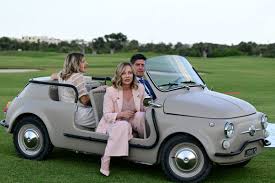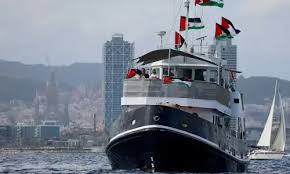Meloni’s head-on collision with Italy’s last big carmaker

Grosseto: Giorgia Meloni has found the ideal target in her economic patriotism crusade.
Over the past months, the Italian government has engaged in a widening array of conflicts with Stellantis — the heir of Italy’s iconic carmaker Fiat, now one of the world’s biggest carmakers — for not investing enough in Italy.
Stellantis — which owns a dozen brands spanning from Alfa Romeo and Maserati to Peugeot, Citroën and Jeep — has long been in the crosshairs of Meloni.
When she was a lawmaker on the opposition benches, she was one of the fiercest opponents of the Franco-Italian merger between Fiat-Chrysler and Peugeot-maker PSA, which gave birth to Stellantis in 2021. Back then, Meloni warned that the deal was a dangerous French take-over of an Italian crown jewel, fueling the evergreen Franco-Italian economic rivalry.
Now she’s in power, the right-wing prime minister is upping her fight against Stellantis in the name of economic patriotism by forcing the company to change the name of a new Alfa Romeo model built in Poland and removing Italian flags from city cars made in Morocco.
Even if a significant part of its cars are made outside Italy, Stellantis is currently the only major carmaker left in the country. The group owns all Italy’s legendary car brands except for Ferrari, which is an independent company, and Lamborghini, which is now owned by Germany’s Audi.
As this tension between the government and Stellantis simmers, Rome is now courting Chinese carmakers to open plants in the country.
“You need to have the courage to criticize decision made by the owner and the management of [Stellantis] when they are at odds with Italian interests,” Meloni said earlier this year, slamming Stellantis for being registered in the Netherlands and arguing that Italy is systematically penalized in the company’s strategic choices because French shareholders are more influential.
That’s just one of many government attacks on a company that has been at the center of Italian politics and public debate for more than a century. Before turning into a multinational group with factories everywhere in the world, Fiat faced economic ups and downs, regularly receiving generous state subsidies and sparking criticism against its founding shareholder, the influential Agnelli family.
“Stellantis is an ideal enemy for Meloni,” according to Lorenzo Castellani, a political scientist at Luiss University in Rome. “It is a group that somehow decided to move away production despite receiving much financial support. It can easily be accused of poor patriotism,” he said, adding that Meloni is, however, losing the battle against the car giant as Italy has no real way to force Stellantis to make more investments in the country.
Meloni’s government and Stellantis committed to produce 1 million vehicles per year in the country. But both the government and unions say Stellantis is not keeping that promise. Production in Italy dropped by over 25 percent in the first half of this year compared to 2023, according to unions. During the very same period, the company’s net profit also almost halved year-on-year, from €10.9 billion to €5.6 billion.
Since the merger with France’s PSA, the company cut more than 10,000 jobs in Italy, mostly by encouraging older workers to retire. This year, several Stellantis production lines in Italy, including for the production of Fiat 500 and Maserati cars, have been put on hold, with workers receiving a reduced salary under the so-called “cassa integrazione,” a short-term payroll subsidy scheme.
On the top of criticizing Stellantis for the lack of investment in Italy, Rome is now banning the company from showing off its Italian bloodline while producing abroad.
In the spring, Italy’s customs and financial police seized 134 Fiat Topolinos, a new electric city car produced by Stellantis in Morocco, because they displayed an Italian flag sticker which, according to Italian authorities, could mislead buyers on the origin of the car. In June, an Italian judge provisionally ruled that even the name of the model — “Topolino” and “Topolino Dolcevita” — wrongly suggest that the car is made in Italy as they are references to an iconic old Fiat model and to Federico Fellini’s legendary movie.
The tiny, squat light-green cars are still blocked at the port of Livorno, on the Tuscan coast. Since then, Stellantis offered to remove the controversial flag sticker and invited Topolino’s owner to come to Fiat garages to have it removed.





